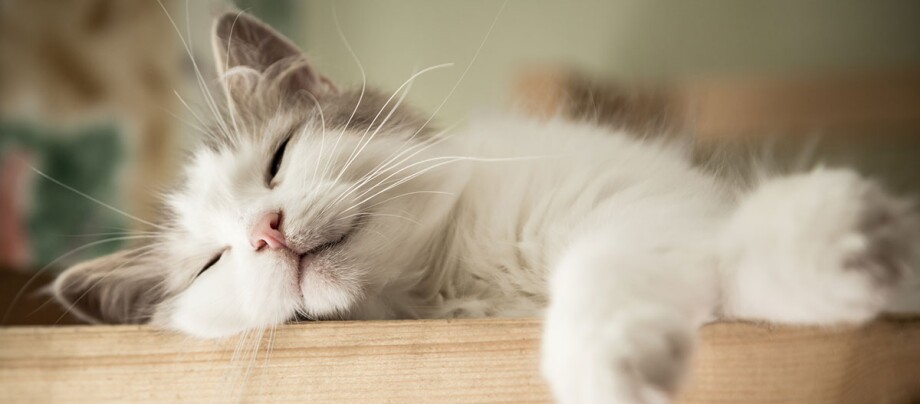When Your Cat Dies - Mourning Your Pet and Coping with Grief
23.11.2022 - Reading time: 4 minutes

The loss of a beloved pet hits cat lovers particularly hard. An intimate relationship has often developed over the years, a relationship that is difficult to explain to outsiders. When the familiar purr or demanding meow ceases, the grief can be overwhelming. Nevertheless, you need to be prepared to make practical decisions when the cat passes away.
When cats die: When should I let go of my cat?
It depends on the circumstances of the death as to how you say goodbye to your cat. If the demise of the pet is foreseeable because the animal is already very old, you are entering a very emotionally stressful period.
- Old cat: Cats have a natural life expectancy of twelve to fourteen years on average, assuming good care and health, but older animals are not uncommon. Cats seem to sense when their natural lifespan is coming to an end. They become more and more withdrawn, eat very little and seek rest. If you notice such behavioural changes, you know it’s time to let go of your cat.
- Seriously ill cat: Also, if the cat has an incurable disease or is suffering from painful old-age complaints, you will sooner or later think about having the cat put down. Even in such a case, you have enough time to consider the next steps and to consciously deal with the animal’s death.
- Accidental death: Cats, especially outdoor cats, belong to a group of pets with a higher risk of accidents. If your cat is unexpectedly injured in a traffic accident, for example, the shock can be even more overwhelming than the grief.
- Acute complications: A cat’s life can end quickly and unexpectedly if otherwise fatal circumstances occur. Such cases may include poisoning. Here, too, you have little time to say goodbye – especially if you have to decide on emergency euthanasia within a very short space of time.
The coping strategies for the potentially delayed onset of grief for the cat are therefore highly individual and depend strongly on the immediate circumstances of the death.
One last time at the vet: When should I have my cat put down?
Unfortunately, not every cat is granted the opportunity to die peacefully in their familiar basket. Whether it is to shorten serious ailments in old age or as a last resort in medical emergency: No pet owner takes the decision lightly to put a beloved cat to sleep. If the suffering becomes too great for the animal, you should try to assess the situation as objectively as possible. Fear of loss or delaying the inevitable end are understandable from a human perspective, but ultimately prolong the animal’s suffering.
Seek advice from your vet: The expert can assess the health condition and the appropriate time for the last visit to the vet. The expertly performed euthanasia is carried out by administering a sedative and an anaesthetic. The cat dies in its sleep and painlessly. Many vets also offer euthanasia during home visits or special appointments outside of office hours: That way you spare the animal any stress in its final hours. The scale of fees for vets (GOT) regulates the costs, which range from 20 to 58 euros. As a side note: You should seek a confidant in advance who will be at your side during the euthanasia. Be clear in advance whether or not you wish to be present. In an unexpected emergency, this decision may be emotionally overwhelming.
Where can I bury my cat?
The question of what to do with the body of the beloved cat presents pet owners with difficult decisions when they lose their little tabby. If the cat is put down at the vet’s surgery and you do not request otherwise, the body will be taken to the local animal carcass disposal facility. This is also your point of contact if you have no other option for burying the cat.
- Burying the cat in the garden: As owner of the property, you can bury the cat without further ado. However, you must be aware of several things. For example, the property must not be located in a nature reserve or water conservation area. The grave should be at least half a metre deep and one metre away from the nearest public path. The animal must be covered in a decomposing material, such as a cardboard box – not in foil or plastic.
- Cremation: If a private funeral is not an option, you can contact a pet crematorium and have your cat’s ashes delivered in an urn. Nowadays, there are pet cremations in every federal state. The cost of cremation usually depends on the weight of the animal.
- Pet cemeteries: Special pet cemeteries where you can rent a grave for your cat can also be found nationwide.
By contrast, it is strictly forbidden to bury a dead cat in a public space, forest or park. This is considered an administrative offence and can cost up to 20,000 euros in fines.
Saying goodbye to your cat - coping with grief
Every cat owner grieves differently for the loss of their deceased housemate. The loss of the animal leaves a void; in everyday life you will notice in all sorts of places that the house cat is no longer there. Allow for these feelings: you have lost a four-legged confidant that cannot simply be replaced. It may help to share your grief with other pet owners who have already experienced such losses.
Rituals may also help: Put up a photo of your pet or plant catnip at the gravesite. Young children who still might have a hazy understanding of “death” may be helped by a fairy-tale idea of a “cat paradise” where cats go when they die. For slightly older children, the possibility of visiting the cat at the grave or attending the funeral is a potential way of dealing with the loss.



